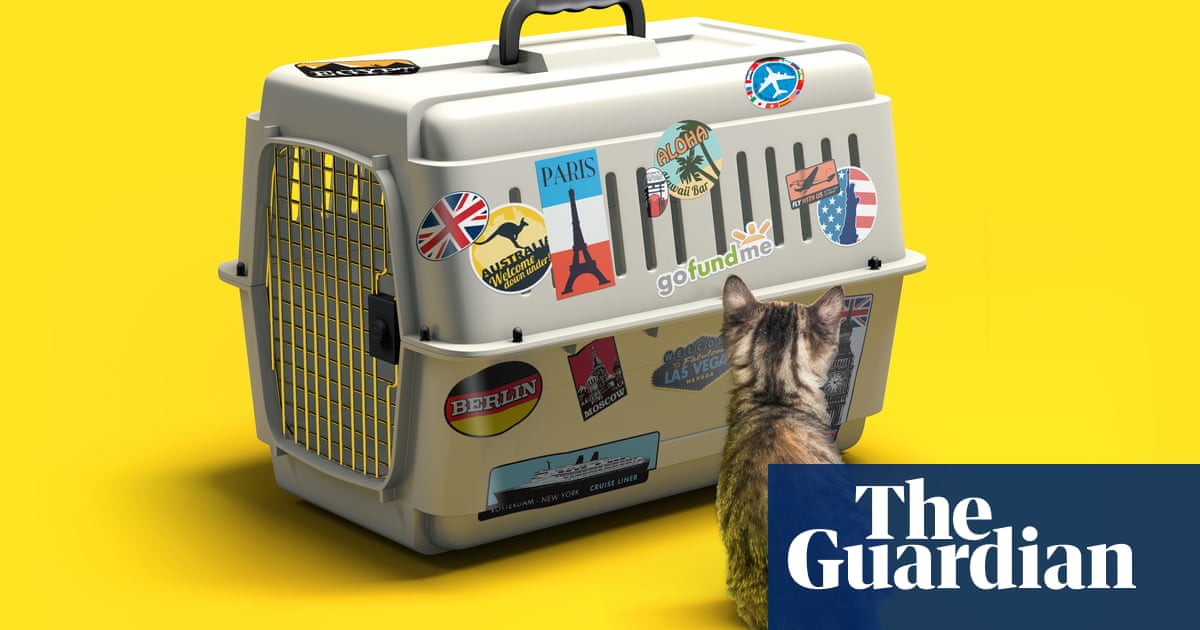Forget sponsoring Bob in accounts to run a charity marathon: these days you can ask anyone for anything

Iwan Carrington wanted AirPods but he couldnt afford them, and for most 16-year-old boys thats where the story would end. Since their release in December 2016, Apples 199 wireless Bluetooth earbuds have become a status symbol among teens: after all, only the wealthy can afford tiny, untethered headphones that are so easy to lose. As an ordinary Welsh schoolboy, Carrington wasnt rich enough to buy them, and he was growing increasingly jealous of his friends pair. So in January this year, he came up with a solution.
With just a few clicks on his computer, Carrington created a page on the crowdfunding website GoFundMe, set a fundraising goal of 100 (he had saved the rest from Christmas), and titled it simply and honestly: I am desperate for AirPods. Help a brother out. The plea was simple and unvarnished: I am like any other teenager except I would love some Apple AirPods. I was sat on the bus untangling my earphone wires and thought how great it would be to have AirPods. I ask for any help. Please. The first comment underneath was similarly direct: This is a shameless act of self-promotion. I totally support it. Eight donors and a few days later, Carrington had raised the money he needed.
For close to a decade, GoFundMe has allowed ordinary people to crowdfund their needs, ranging from medical bills to tuition fees to emergency expenses. As the internets largest crowdfunding platform, the site has raised more than $7bn since 2010, with one-third of all donations going towards peoples healthcare costs. Yet while the site helps many in times of crisis, it increasingly hosts a vast number of campaigns that are less about people in need and more about people in want.
I rang Carrington to ask if he felt cheeky requesting money from friends, family and strangers online after creating the page, he shared it on social media and via email. At the start, yeah, he says. But when I actually got my AirPods I thought, Never mind, I like this. He had already checked the site to see if other people had run similar campaigns, and knew he wasnt the first; at the time of writing, GoFundMe had 4,649 results for the search term AirPods. It made me feel comfortable doing it.
Carrington adds that the people who donated were mainly businessmen and women family friends who could afford to. I dont feel guilty because theyre not exactly poor they werent giving away their life savings. His mother, Abi Jenkins, who is 36 and works in the travel industry, tells me she didnt know about her sons plan until she got the email inviting her to donate. Was she embarrassed? I initially thought it was a bit cheeky. But at the same time I thought, Ive always encouraged the children to be entrepreneurial.
In recent years, there has been a distinct cultural and psychological shift when it comes to crowdfunding. Where once only those with the saddest stories and the rarest illnesses felt comfortable asking the internet for money, there are now endless campaigns for endless causes. When I looked on GoFundMe there were 675 results for boob job, 5,209 for Xbox, and 47 people looking to raise the cash for Louis Vuitton bag. Ever since I was a pre-teen my wish has been to own a designer handbag, reads one page. But not every post flies: in four months, the Louis Vuitton request has raised just $150 of its $1,000 goal.
There are thousands of similar campaigns stuck at the 0 mark. No one has yet coughed up a penny of the 300,000 required to Get Dan a Lamborghini, despite the promised free ride. Yet requests like Carringtons those that are honest, funny and realistic are becoming increasingly successful. A Scot has so far raised 22,827 to help his new cat Nala travel the world on the front of his bike. His goal was 6,000. Over the course of 12 hours in June, more than $5,000 was raised for a waitress who claimed she had been fired after spitting on Donald Trumps son, Eric. That same month, donors raised 59,000 to pay the legal fees of a London cyclist who had collided with a woman who was looking at her phone while crossing the road. More than 4,000 people donated via a page set up by his friend, raising more than double the requested sum, even though the judge ruled both parties equally responsible for the accident.
From bankrolling new products on Kickstarter to supporting artists with a monthly donation via Patreon, there is now a platform for everything (the Guardian has been asking readers for donations since 2016). Ko-fi allows all kinds of creators to ask people to support their work by donating the price of a coffee; OnlyFans is popular with models and sex workers, who can share videos and pictures for cash; Unbound enables readers to back a book before its published. Crowdfunding has its dark side, too: from 2017 to 2018, Hatreon enabled white supremacists to make a living from their hate speech. The site took $25,000 a month in donations before Visa suspended its services.

The means by which we can solicit and donate cash or gifts have grown increasingly imaginative. People can remotely send one another pints (or portions of peas) via an app created by the Wetherspoons pub chain: you post your table number and pub name, and let friends or strangers send you gifts from the bar or kitchen. Youll be hard-pressed to find a viral tweet that isnt followed up with a cheeky link to the tweeters Cash App, Amazon Wishlist or PayPal. An Uber driver who shared the playlists he created for customers in 2018 earned over 200,000 likes on Twitter, and followed up by asking his new fans to send me $5 (online magazine Slate has dubbed this the Twitter Invoice).
When did asking strangers for money stop being embarrassing? Elizabeth Gerber, a professor at Northwestern University, Illinois, who has been studying crowdfunding for more than 10 years, argues that todays shift can be attributed to two technological changes: the increasing ease with which we can safely transfer money online; and the ability we now have to reach anyone on the internet. Theres an increased comfort with giving money online, and consequently, the comfort with asking has increased as well, she explains. As it becomes more and more normalised, people feel able to ask anyone for anything.
Gerbers research has found that people like to make charitable donations online because their name becomes visibly associated with a cause; on many crowdfunding sites, donors are listed down the righthand side of the campaign page. She adds that for all requests people tend to dip into their spare cash, money theyd typically use for leisure activities. Theyre donating money theyd normally use to go to the movies or a concert, she says, noting that crowdfunding pages like Carringtons provide their own form of entertainment in return for cash.
There are social as well as technological factors driving the boom in online giving and receiving. Gerber notes that, in a world where social media has taught us to exchange likes and comments, it is almost natural that we should begin exchanging money, too. If you post something on Facebook and somebody likes it, theres a pressure to respond and that pressure has increased over time. She says that people tend to give reciprocally, sometimes donating the exact amounts they have received from friends.
Crowdfunding is nothing new. The plinth for the Statue of Liberty was paid for by 160,000 donors in the 1880s, and we have collectively donated towards non-necessities like weddings for centuries. The digital revolution began in 2000, when solicitor Zarine Kharas approached Belgian businesswoman Anne-Marie Huby, head of the UK arm of Mdecins Sans Frontires, and launched JustGiving, a platform that allowed anyone to raise money for charitable causes. The website now gives users two options: you can fundraise for a charity, or crowdfund for personal causes.
Although the website remains far more charity-oriented than many other crowdfunding sites (results on searching AirPods: five), both the user and the consumer have changed significantly over the past 19 years, according to JustGivings UK general manager, Keith Williams. Its more social, more personal, he says, explaining that a crowdfunding page for a personal cause can reach its targetin 30-33 days, while fundraising for charity often takes longer, at more than 100 days. Its super-fast, super-viral, he says of the personal campaigns. They have four times more shares [than the charity requests], and the pages raise between 20 and 30% more.
Personal stories are at the heart of modern crowdfunding; since the early noughties, the language of need and necessities has been usurped by the language of hopes, dreams and desires. Take the man who raised more than 20,000 to travel with his cat. Through Montenegro we explored abandoned villas and hidden beaches, with Nala on my shoulder through the good and the bad, he wrote on his page. There are now 1,235 results for backpacking on GoFundMe, with headlines like Help me chase my dreams or Being a backpacker is amazing but it is very expensive.
The launch of JustGiving inspired a number of other crowdfunding sites that were geared more towards creativity, rather than charity. In 2001, ArtistShare began allowing fans to finance musicians projects; in 2008 and 2009, IndieGoGo and Kickstarter, respectively, enabled ordinary people to fund their passion projects, launching their own businesses, products and services. These websites developed rewards-based models, whereby donors essentially became investors: months after their donation, they might receive an album or a new smartwatch in the post.
When GoFundMe launched in 2010, it was the first mainstream service that didnt require users to meet their funding goals in order to cash in their money, encouraging more people to solicit for more things. And without feeling the pressure to help a project reach its goals, donors could also give smaller amounts in a more spontaneous way.
According to John Coventry, Europe and Australia director at GoFundMe, crowdfunding has moved beyond its utilitarian phase and evolved into an act of solidarity and support. (He adds that the UK is GoFundMes fastest-growing market outside the US.) What Coventry describes as earlier medical, memorial and emergency campaigns have paved the way for a more social form of giving. He cites the success of a 2017 campaign for a replacement window in a student house, which raised 2,835 10 times the desired amount. The reason the window needed replacing? A student who had gone back to the house on a date had panicked on finding that the toilet wouldnt flush and had thrown a poo, wrapped in toilet paper, out of the window. It had landed between two panes of glass, which eventually had to be smashed by the fire brigade in order to free the student who had attempted to retrieve the poo.

Coventry believes that as people became used to receiving GoFundMe requests, they stopped being embarrassed about creating their own in much the same way, he says, that you might have been nervous the first time you ordered an Uber, and now its part of your everyday life. The internet has given tools that were only available to big companies or governments and put them in the hands of people, he says.
The normalisation of crowdfunding can be related to wider global trends, from the 2008 economic recession to austerity politics and David Camerons notion of the big society, one in which volunteers filled the role of the state. There are 728 GoFundMe results for the search term Universal credit and 11,846 for food bank. Universal credit paid my mum 6 for the month, reads one page. My mother is 55. Shes worked all her life. She was attacked in her care job months ago and now has a serious back injury and her doctor will not let her go back to work. Shes had to apply for UC. She got her first payment today: 6. The page raised more than 7,000.

In the face of budget cuts, British schools are now using Amazon Wishlists to crowdfund their classroom needs, asking people to donate stationery, books and sports equipment. Jenny Rogers, headteacher at Copmanthorpe primary school in York, set up an Amazon Wishlist to bulk up the schools library; on the day before we speak, the school was gifted an entire set of Harry Potter novels by a parent. Ive been a headteacher for nine years and budgets have become even tighter, Rogers says. Books and things that we should be able to afford are now almost a luxury.
You could argue that ordering books via Amazon is only marginally different from handing over 50p in the hope of winning the raffles finest bottle of bubble bath at the school fete. But one significant change has been at university level, where online crowdfunding moved from a needs- to a wants-based model in the late 2000s. In 2012, GoFundMe co-founder Brad Damphousse told Bloomberg Businessweek that university students were increasingly using his site to pay their tuition costs, including for opportunities to study abroad.
Because a masters degree is not usually seen to be as much of a necessity as pencils for 10-year-olds, good storytelling tended to predicate a crowdfunders success. As a creative writing student, Lulu Jemimah knows how to structure a narrative. In 2017, the 32-year-old Ugandan was accepted on to Oxford Universitys creative writing masters programme; unable to find the fees herself, she successfully crowdfunded the first year of her tuition. In 2018, after attempting and failing to earn the money for her second year, Jemimah decided to marry herself.
I felt really embarrassed to do a second crowdfunding, Jemimah says now. So I thought I could use my wedding as a story. Frustrated that relatives and family friends were unimpressed with her studies and instead repeatedly asked her when she would marry and have children, Jemimah hired a wedding gown, asked her brother to bake a cake, and married herself on her 32nd birthday in August 2018. Two months later, she used footage from the day to crowdfund the second year of her masters. This is my love story, she wrote. I got married to the one person I am certain will take care of me. She described seeing snow for the first time, and sleeping in the college library. I thought people were going to ridicule me, but then it got picked up, she says.
In total, Jemimahs two crowdfunding efforts raised 23,937 from 448 people. People were apologetic, which I found really strange, like Sorry, I only have 20, she says. I was just overwhelmed by the support. But there were angry messages, too, from people who felt Jemimah should have earned the money herself. You almost have to struggle to remember the positive comments, she says. Because I would read a negative comment and my whole day would be ruined.
In February this year, an Edinburgh couple were told to get a job and stop scrounging by angry commenters after they started a GoFundMe to raise 4,500 for their wedding. In June, a German influencer couple who asked for 10,000 to fund their tandem cycle to Africa found their social media accounts flooded with posts calling them narcissists, douchebags and entitled. (They had half-anticipated this, writing in their original Facebook post: Some will tell us to get jobs like everyone else, and stop begging. But when you have the impact we do on others life, getting a job is not an option.)
For many people who have benefited from crowdfunding, free money isnt always as free as it seems. There is a lot of guilt, says Jemimah. Sometimes when I want to watch a movie I think, No, you have to be focusing on your work.
Mollie Goodfellow, a 26-year-old comedy writer and popular Twitter personality, admits that she felt embarrassed after receiving gifts when she shared an Amazon Wishlist with her 32,000 followers. (The page had been set up for family and friends, but after Goodfellow tweeted it once, she started receiving books from strangers.) It made me feel really conflicted, she tells me. Obviously I was grateful and touched, but I felt guilty that they would spend their money on me when all I really do is write dumb tweets.
Gerber points out that giving isnt always as altruistic as it seems. The hope is that if you back somebody else who has a big network, they will share your project with their network. So youre paying for access, she says. This becomes problematic when we foster online parasocial relationships relationships in which one person feels close to a high-profile individual who isnt aware they exist. The personal stories shared on crowdfunding sites can make donors feel they know a stranger when, in reality, they arent who they seem to be.
In July this year, Henry (not his real name), a 29-year-old copy editor from Boston, donated $50 via the digital wallet app Venmo to a low-profile comedian who posted on Twitter that he was depressed and suicidal. I decided to donate because he seemed like he was going through a really hard time, Henry says. Days later, the comedian was accused of sexual harassment and abuse by two women, leading to further rumours that he used the crowdfunded money to buy drugs.
I felt gullible, but mostly I was upset on behalf of his victims and hoping that the money I gave him didnt perpetuate his addictions and lead to him hurting anybody, Henry says now. Crowdfunding is now so ubiquitous that the solution was simple Henry went on to donate to the women who had accused the comedian of abuse, after they tweeted links to fundraising pages.
Ultimately, of course, it is up to donors how they choose to spend their money and often they have no expectations of a return on their investment. Philadelphia-based project manager Matt Black crowdfunded his Halloween and Day of the Dead-themed 50th birthday party last year, and says he had no complaints. He had not seen anyone else use GoFundMe to throw a party, but had used the site to donate to a friend who was struggling to make his mortgage payments. Inspired by that example, he made his request as candid as possible. Okay, I know that GoFundMe campaigns are usually for charity or worthy causes, and it could seem egotistical and selfish to crowdfund my own birthday party, but… , Black wrote, before explaining that he wanted a celebration of life in lieu of presents. Its not Woe is me, feel sorry for me, I cant afford this or that, he says. This is a party for me and my friends, and I chose it to be a relatively expensive event. He raised $940 of his $1,500 goal from friends, hired his favourite band, rented a room in his local bar, and encouraged his guests to wear costumes. Not everyone who donated turned up; Black says people used their gift as a way to apologise for not being able to make the event.
Every day, across all the various fundraising platforms, the requests keep coming: often hitting that sweet spot between incredibly mundane and genuinely unusual. I want to dye my hair blond, please help a gal out, reads one, from a woman in Ireland, posted on 11 August. Im 20 years old and I want my first car to be a Mercedes-Benz, says another, posted in June. A woman in London wants a new hamster cage for her lovely ball of fur, Mozzarella. A man in the West Midlands wants 500 for his stag do. A college student in Wraysbury, Surrey, needs to pay off his parking ticket. Many of these people might not earn a penny from strangers on the internet, but what theyre doing is no longer seen as strange.
A man from Ohio has set up a GoFundMe page for a preemptive emergency fund a just-in-case pot. Im setting this up to help with any legal/medical/repair debts that are inevitably going to happen, he wrote, setting his target at $10,000. Why not? Im sure youve donated to dumber causes.
If you would like a comment on this piece to be considered for inclusion on Weekend magazines letters page in print, please email weekend@theguardian.com, including your name and address (not for publication).
This article contains affiliate links, which means we may earn a small commission if a reader clicks through and makes a purchase. All our journalism is independent and is in no way influenced by any advertiser or commercial initiative. By clicking on an affiliate link, you accept that third-party cookies will be set. More information.
Read more: https://www.theguardian.com/technology/2019/aug/24/grand-my-cat-gap-year-rise-of-i-want-crowdfunding


Recent Comments